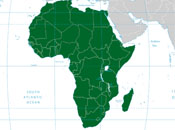
The shale gas boom seems to be igniting all over the world, but in Africa, there are still only a handful of countries that are jumping on board.
South Africa (which holds the fifth-largest reserve in the world), Morocco, Algeria, Tunisia, Libya and Egypt are among the small group of countries that have the potential and are exploring for gas on the continent, according to the U.S. Energy Information Administration.
This is interesting because if you look at a map showing shale gas production around the world, it is virtually blank south of the Sahara desert. Still, experts are optimistic that good reserves are there to be had.
The standard procedure for any drilling practice nowadays involves hydraulic fracturing, or fracking, where massive amounts of water, chemicals, and sand are blasted deep into the ground to open the shale rock and release the reserves. This practice, combined with horizontal drilling, has helped shale gas production soar recently in parts of the world like the U.S. and Canada.
And this is the procedure that Africa will need to instill if it's going to see any success in the procurement of its shale resources.
The World Bank has agreed to help jump start the implementation of Malawi's $84.7 million Energy Sector Support Project, which has run into its share of delays on its own. Malawi is a landlocked country in southeast Africa formerly known as Nyasaland. With this special funding, it is a telltale sign that energy in Africa is headed in a new direction.
The project's main goal is to improve the operational capacity of Malawi's hydro-based electricity sector while also identifying alternative energy sources like shale gas.
The project is still in the process of obtaining consultants, but it is fully expected to take flight in the coming year.
NuEnergy
Meanwhile, just last month it was reported that NuEnergy Gas Ltd. (ASX: NGY), an Australia-based power and development company, launched a geophysical exploration campaign for shale gas and coal-bed methane at its 134 square mile area it has licensed in the district of Chikhwawa in the lower Shire Valley region of Malawi.
The company said it is optimistic that significant shale gas finds will happen in eastern Africa, where it has begun its focus. It has started searching for gas in Malawi in coordination with the country's energy project and has also applied for permits in Tanzania, Zambia and Mozambique.
The first order of business was to conduct an aeromagnetic survey of the 134 square miles of land in Malawi to determine precisely where drilling should start. It was the first time the country had ever had such a survey conducted, and results are expected in the next three weeks. The company has one drill rig already in place and operating in Malawi.
Tanzania will be the next step for NuEnergy, where large resources are expected to be held. Once a permit has been obtained, the 40 trillion cubic feet or so that it potentially holds will be put to the test.
The Tanzanian government has presently ceased permit approval while it re-drafts its policy on gas after its most recent discoveries of offshore gas reserves. Besides that, the government has already announced plans to auction licenses for seven of its offshore blocks and one section of Lake Tanganyika in October.
The shale gas that NuEnergy does come up with will most likely be used domestically, being sent to micro-liquid-natural-gas plants that are much less expensive to build and maintain than larger LNG factories that can cost several billion dollars.
Across Africa
If Africa gives a strong concerted effort to exploring and producing shale gas in its continent, it would surely join the ranks of other world-leading producers like the U.S.
Algeria has moved up the world ranks from number nine, now holding the third largest shale gas reserve in the world. Only Argentina and China have more technically recoverable shale gas resources.
It looks like Africa is finally realizing the economic benefits of its shale reserves, and while it's still taking its first steps as you read this, it could easily explode in 2013.
North Africa is said to have modest reserves, but even that statement is unfounded, and it could hold more potential than thought. Companies like Royal Dutch Shell (NYSE: RDS-A) and Chinook Energy Inc. (TSX: CKE) have leased land in the region.
Sasol Limited (NYSE: SSL), Shell, Statoil ASA (NYSE: STO), and Chevron Corp. (NYSE: CVX) are all positioning themselves in South Africa.
Shale gas exploration is going to take heat no matter where it goes because it does come with its suspected health hazards, like water contamination from fracking. But the industry is also cleaning up its mess, and drilling practices have become much safer recently. Many of the problems from five years ago aren't seen today.
South Africa in particular has opposed some drilling efforts in the past, but it lifted a moratorium on fracking in September of 2012.
Africa as a continent is ready to get drilling.
Justin Williams
Energy & Capital

























































